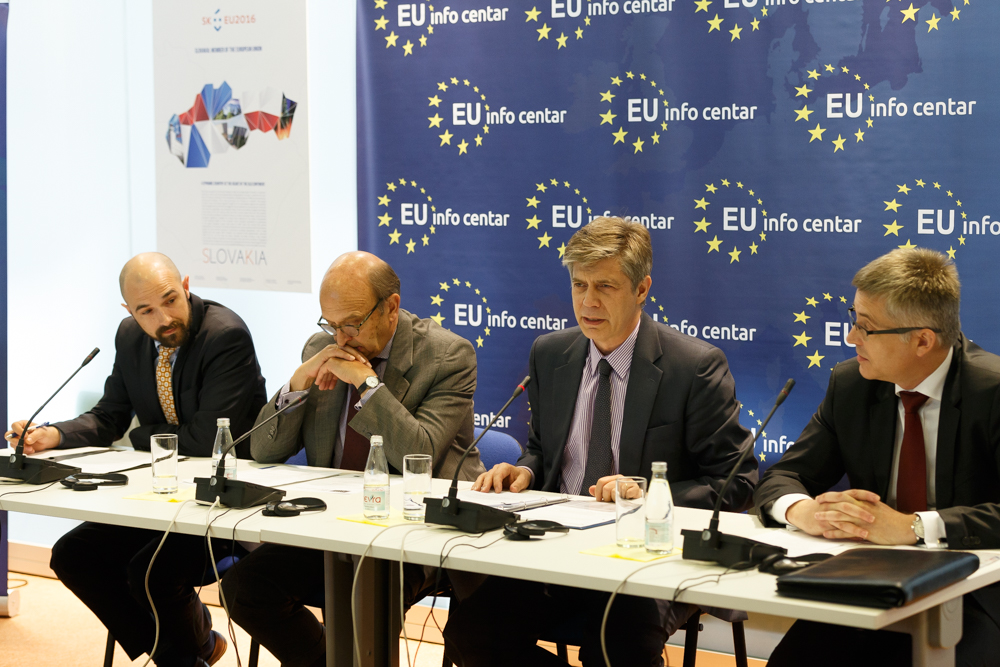
The Netherlands hands over the keys of the EU presidency to the Slovak Republic
On the occasion of the transfer of the presidency of the Council of the European Union, the European Union Delegation to BiH, together with the Embassy of the Kingdom of the Netherlands and the Embass...
On the occasion of the transfer of the presidency of the Council of the European Union, the European Union Delegation to BiH, together with the Embassy of the Kingdom of the Netherlands and the Embassy of the Slovak Republic organised a round table discussion at the EU Info Centre on June 29.
The presidency of the Council rotates among the EU member states every 6 months. During this 6-month period, the presidency chairs meetings at every level in the Council, helping to ensure the continuity of the EU’s work in the Council.
In his opening remarks the Head of the EU Delegation to BiH and EU Special Representative, Ambassador Lars-Gunnar Wigemark underlined that the EU still stands strong and upholds its core values of promoting peace and the well-being of its peoples. He has also referred to the genesis of relations between the EU and the Western Balkans stressing that the EU is here to stay and assist the country on its way to the EU.
“In early 2016, we saw BiH submit its application for membership in the European Union. I welcome the commitment of most of the country leaders as we must continue to work hard, and BiH leadership needs to demonstrate true commitment to progress on the EU path,”, Ambassador Wigemark concluded.
The Ambassador of the Kingdom of the Netherlands in BiH Jurriaan Kraak made an overview of chairing the EU Council summarizing some of the key issues during this period, including challenges such as terrorism, migrant crisis and the situation on the eastern border of the EU. Reflecting on the situation in BiH, he has emphasised the Netherlands’ commitment to the EU path of the country.
“Since 1990’s, the Netherlands has been closely involved in the developments in this country: we are still an important bilateral donor. For that reason, putting the debate on the topic of the membership application on the agenda of the General Affairs Council during our EU Presidency would have given us special satisfaction, as proof that, finally, Bosnia and Herzegovina is on its way and heading towards Europe. Two days before our Presidency ends, none of the 28 members of the Council thinks the time is right for that debate. The Commission is of the same opinion. The Netherlands Presidency sincerely regrets that it cannot preside over the next step in the accession process of BiH. We had hoped to give the festive reception of the membership application of 15 February a positive follow-up”, Ambassador Kraak concluded.
According to the Ambassador of the Slovak Republic, Jan Psenica, the Slovak presidency of the EU Council will be active, with a focus on migration and the recent Brexit.
“Our four main priorities are an economically strong Europe, a modern single market, sustainable migration policy and a globally engaged Europe,” he said adding that Slovakia wants BiH to become part of the EU. “The EU has brought hitherto an unprecedented period of peace, prosperity and stability for Member States and the European area and we now need to continue with the activities to adapt the project to the new circumstances, and we would like to see Bosnia and Herzegovina as part of the process“, Ambassador Psenica concluded.
Member states holding the presidency work together closely in groups of three, called ‘trios’. This system was introduced by the Lisbon Treaty in 2009. The trio sets long-term goals and prepares a common agenda determining the topics and major issues that will be addressed by the Council over an 18-month period. The current trio is made up of the presidencies of the Netherlands, Slovakia and Malta. On the 1stof January 2017 Malta will take over the presidency.
